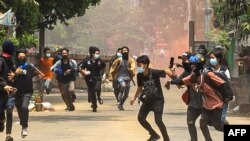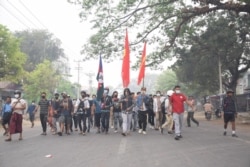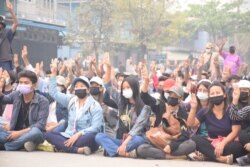Two more people were killed as thousands of pro-democracy demonstrators took to the streets again Tuesday in Myanmar’s largest city of Yangon and in several other towns to oppose military rule of the country since the Feb. 1 coup.
Myanmar security forces have since killed at least 512 civilians, according to the Assistance Association for Political Prisoners.
Trash piled up at intersections in Yangon as protesters launched a garbage strike and security forces reportedly fatally shot a man in the southern town of Kawthaung and killed another person in the northern town of Myitkyina.
Three of the country’s armed ethnic rebel groups, meanwhile, threatened the junta Tuesday with retaliation if it does not stop killing protesters.
“If they do not stop and continue to kill the people, we will cooperate with the protestors and fight back,” the Ta’ang National Liberation Army, the Myanmar Nationalities Democratic Alliance Army and the Arakan Army said in a joint statement.
On Monday, security forces killed 14 people during demonstrations in towns across the country following the deadliest weekend since the February military coup, according to the Assistance Association for Political Prisoners (AAPP.)
Eight of the deaths that took place Monday occurred in Myanmar's main city, Yangon, according to AAPP.
Protests took place Monday throughout the country, including in Sagaing region, where hundreds of mourners lined the street to pay tribute to a 20-year-old nursing student who was shot and killed Sunday while helping provide aid to injured protesters.
The United Nations say Myanmar’s security forces killed at least 107 people Saturday as the regime staged a major show of might for Armed Forces Day, which commemorates the start of local resistance to the Japanese occupation during World War II. AAPP puts Saturday’s death toll at 141.
“What has happened on the national day of armed forces was horrendous,” U.N. Secretary-General Antonio Guterres said at a news conference Monday.
"It is absolutely unacceptable to see violence against people at such high levels. So many people killed, and such a stubborn refusal to accept the need to liberate all political prisoners and to make the country go back to a serious democratic transition," he said.
Also Monday, the United States suspended a trade agreement with Myanmar, also known as Burma, until democracy is restored in the country.
“The United States supports the people of Burma in their efforts to restore a democratically elected government,'' U.S. Trade Representative Katherine Tai said in a statement.
Tai said the military’s killing of peaceful protesters "has shocked the conscience of the international community."
The announcement does not stop trade between the United States and Myanmar, but it suspends a 2013 Trade and Investment Framework Agreement that laid out ways to boost business between the two countries.
Tai said the United States would also consider Myanmar's participation in the Generalized System of Preferences program, which reduces U.S. tariffs and provides other special trade access for some developing countries.
The United States had already imposed economic sanctions on Myanmar following the February 1 coup.
“We condemn this abhorrent violence against the Burmese people,” White House press secretary Jen Psaki said Monday.
Defense chiefs from a dozen countries, including the United States, issued a rare joint statement Saturday condemning Myanmar’s use of lethal force against unarmed people.
“A professional military follows international standards for conduct and is responsible for protecting — not harming — the people it serves,” the statement said.
The statement was backed by defense chiefs from Australia, Britain, Canada, Denmark, Germany, Greece, Italy, Japan, the Netherlands, South Korea and New Zealand.
“It’s terrible,” U.S. President Joe Biden told reporters Sunday of the violence in Myanmar. “It’s absolutely outrageous. Based on the reporting I’ve gotten, an awful lot of people have been killed. Totally unnecessary.”
Myanmar’s security forces further escalated violence Sunday by opening fire on a funeral in Bago, near the commercial capital of Yangon. The funeral was held for 20-year-old Thae Maung Maung, who was one of the protesters killed on Saturday.
Former de facto leader Aung San Suu Kyi's National League for Democracy (NLD) led Myanmar since its first open democratic election in 2015, but Myanmar's military contested last November's election results, claiming widespread electoral fraud, largely without evidence.
On February 1, the military removed the NLD government, detaining Suu Kyi and President Win Myint. Martial law has been imposed in townships across Myanmar.







